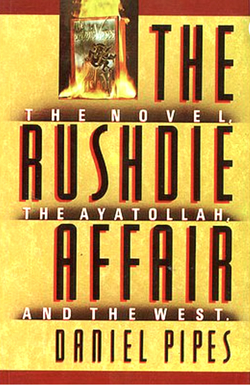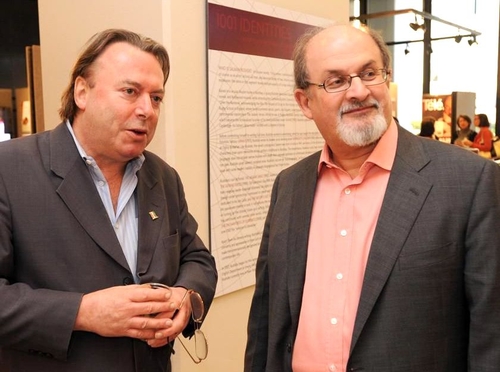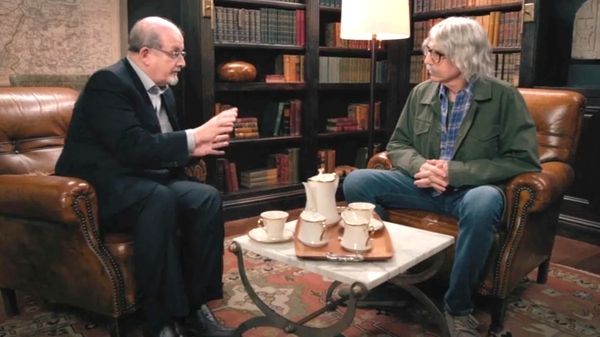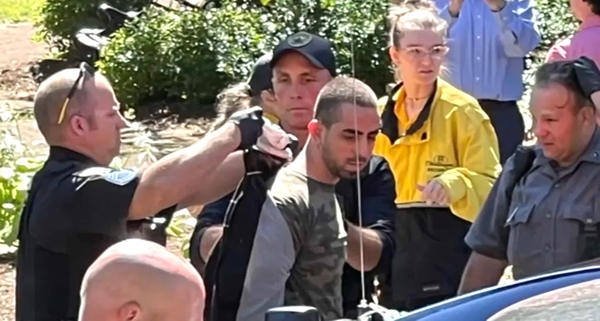 Daniel Pipes, The Rushdie Affair, has been published. |
Hoping to escape the death sentence imposed on him by Ayatollah Khomeini, Salman Rushdie has just affirmed his Islamic faith and called on the publisher of The Satanic Verses neither to issue the book in paperback nor to allow it to be translated. I respond in the Los Angeles Times today that this appeasement will serve no purpose. Indeed, it
is the sheerest wishful thinking. ... The Satanic Verses remains a vibrant cause among Rushdie's enemies - and they are not shy about reminding him of this. ... The threat [to his life] comes from the fundamentalists who scorn an apology from Rushdie - whose execution they see as an ultimate act of homage to their ayatollah. Nothing Rushdie says or does will change the minds of these zealots. The threat against Rushdie, in short, is permanent.
This weblog entry records Rushdie's breezy statements of optimism and invulnerability, the threats against him, and my warnings to him. (December 28, 1990)
Dec. 29, 1990 update: In a letter to the editor today, I accuse Salman Rushdie of "wishful thinking" and warn him that nothing he "says or does will change the minds" of "the fundamentalists who threaten his life. ... The threat against him remains permanent."
Sep. 25, 1998 update: After a meeting of British and Iranian officials, Rushdie euphorically declared that "There is no longer any threat from the Iranian regime. The fatwa will be left to wither on the vine. ... When you're so used to getting ... bad news, then news like this is almost unbelievable. It's like being told the cancer is gone. Well, the cancer's gone."
Oct. 2, 1998 update: I repeat my warning today at "Is Salman Rushdie a Free Man?"
a few words of caution directed to Salman Rushdie. ... Many fundamentalist Muslims hold the late Iranian leader in a uniquely high regard and allow no mere bureaucrats to negate his pronouncement. For them, the death sentence remains an irrevocable legacy of Khomeini, far beyond the control of apparatchiks in Tehran.
Dec. 1, 1998 update: Another warning in a long article devoted to puncturing the author's misplaced hopes, "Salman Rushdie's Delusion, and Ours":
the threat to Salman Rushdie is as great as it ever was. Indeed, it may be even greater now that he and others have convinced themselves it has ceased to exist.
Apr. 4, 2001 update: Rushdie bitterly complained that the organizers of the 11th Prague Writers' Festival had prepared excessive security for him:
Assumptions about what my life is like are not exactly correct. They might be correct about what it was like at the very beginning. But really, I've been getting my life back step by step for quite a long time. And it is one of the reasons, I've said so several times in the past couple of days, that to be here and find a relatively large security operation around me has actually felt a little embarrassing, because I thought it was really unnecessary and kind of excessive and was certainly not arranged on my request. I spent a great deal of time before I came here saying that I really didn't want that. So I was very surprised to arrive here and discover a really quite substantial operation, because it felt like being in a time warp, that I had gone back in time several years.
Aug. 11, 2003 update: Christopher Hitchens, in his usual dyspeptic manner, has attacked me for my skepticism about the end to the danger facing Salman Rushdie
One of the most frontal challenges from Islamic theocracy came in February 1989, when the Ayatollah Khomeini pronounced a sentence of death upon Salman Rushdie. There then followed a long campaign by writers and scholars and diplomats, culminating in September 1998 in a formal repudiation of the fatwa by the Iranian regime. Good cause for celebration, one might think. But not to Pipes, who weighed in with a sour, sophomoric article arguing that nothing whatsoever had changed and that the Iranian authorities were as committed to Rushdie's elimination as ever. His "sources" were a few clips from the Iranian press and a few stray statements from extremists. That was five years ago. Today, Salman Rushdie lives in New York without body guards and travels freely, and there are leading Shiite voices raised in Iran in favor of the coalition's successful demolition of the Iraqi Baath Party. To put it bluntly, I suspect that Pipes is so consumed by dislike that he will not recognize good news from the Islamic world even when it arrives. And this makes him dangerous and unreliable.
Comments: I am delighted that Rushdie "lives in New York without body guards and travels freely." I wish him a long and healthy life. But the threat of some Islamist taking it into his own hands to assault Rushdie remains so long as the author lives.
 Christopher Hitchens (L) and Salman Rushdie. |
June 5, 2004 update: The "Committee for the Commemoration of Martyrs of the Global Islamic Campaign," an agency run by the Iranian Revolutionary Guards, has registered 10,000 volunteers for "martyrdom operations" - i.e., suicide attacks. The committee's spokesman, Mohammad Ali Samadi, explained it has three main targets: "the occupying American and British forces in the holy Iraqi cities, all the Zionists in Palestine, and Salman Rushdie." Explaining the inclusion of Rushdie on this list, the spokesman went on: "Salman Rushdie is the only non-military target for us, because we believe his attack against Islam was much worse that a military assault."
Jan. 20, 2005 update: Today comes the news that Iran's supreme leader, Ayatollah Ali Khamene'i, told Iranians on their way to the hajj (annual pilgrimage to Mecca) that Rushdie is an apostate whose execution is authorized by Islam. In the midst of a tirade against "Western and Zionist capitalists," he commented, "They talk about respect towards all religions, but they support such a mahdur ad-damm murtadd as Salman Rushdie." (A murtadd is an apostate from Islam and mahdur ad-damm means someone whose blood may be shed with impunity.)
With this, Khamene'i reaffirmed Ayatollah Khomeini's 1989 edict against Rushdie. Of course, British officials – eager for trade with Iran – "anxiously played down" these comments. A senior British official dismissed this statement by saying it "should not be taken as a new development." An unnamed Tehran-based analyst conveniently agreed: "This isn't shocking — it's nothing new." I do hope Rushdie is properly shocked.
Feb. 12, 2005 update: If further confirmation of the edict were needed, the Revolutionary Guards provided it today in a document faxed to Reuters: "This statement, while stressing the irrevocability of the death verdict against Salman Rushdie, says history shows that the Muslims have in no era accepted their sanctities being defiled. The day will come when the Muslims take retribution for apostate Salman Rushdie's transgression against the holy Koran and the Prophet Mohammad."
June 8, 2005 update: An obscure incident took place at the Beverley House Hotel in Sussex Gardens, Paddington, London, on Aug. 3, 1989. An unidentified Arab staying at the hotel had two bombs with a total of 50 pounds of military high explosives. One bomb exploded prematurely, killing him, setting off a fire, and doing extensive damage to the building. A Lebanese group, the Organization of the Mujahidin of Islam, announced in connection with the blast that "Muslims mourn their first martyr, Gharib, who died while preparing a daring attack against the apostate Salman Rushdie."
 The Beverley House Hotel, London. |
Sixteen years later, Anthony Loyd makes sense of the above event for the Times of London:
A simple grey slab in Tehran's Behesht Zahra cemetery, resting place to thousands of Iranian soldiers killed in the war with Iraq, holds the clue to a conundrum. The symbolic empty shrine bears the words: "Mustafa Mahmoud Mazeh, born Conakry, Guinea. Martyred in London, August 3, 1989. The first martyr to die on a mission to kill Salman Rushdie."
Although the name Mazeh, the alias of an unknown 21-year-old Lebanese, will be familiar to students of Islamic terrorism, the inscription appears to confirm an assassination attempt that has never been admitted by the British security services. ...
At an inquest in January 1990, Scotland Yard's antiterrorist squad had noted only that there was "a hint" that Mazeh belonged to a terrorist group, saying that his reason for being in London was "not clear". Although Rushdie was mentioned in an initial claim, police had no evidence of a link. ...
Mazeh was already under surveillance by the DST, the French counter-espionage agency, before Khomeini issued the fatwa. The radicalised Lebanese citizen, born in the Guinean capital, Conakry, had joined a local Hezbollah (Party of God) cell while in his teens. The Shia group, under pressure in Lebanon, was extending its structure into West Africa, and Mazeh was next traced in the Ivory Coast in 1988.
Pursued by security agencies, he succeeded in getting a French passport in Abidjan from an official later arrested by the DST in Toulouse, southern France. Moving to Lebanon, Mazeh stayed for a time at his parents' village outside Beirut. British security services retrospectively placed him next in the Netherlands, where he sailed from the Hook of Holland to Harwich, taking a train to London on July 22, 1989. He checked in to Room 303 at the Beverley House Hotel, a five-storey building in Sussex Gardens, Paddington.
On the afternoon of August 3, a large explosion killed him in his room, destroying two floors of the building. Anti-terrorist squad detectives later said that he had died while trying to prime a bomb hidden in a book with RDX explosives. A previously unknown Lebanese group, the Organisation of the Mujahidin of Islam, claimed in a letter to a Beirut newspaper that Mazeh, whom they referred to as Gharib, died preparing an attack " on the apostate Rushdie".
Little more was heard of Mazeh or his mission until 1998, when during a period of renewed détente, diplomatic links with Britain were re-established after the Iranian Government stated that it would neither support nor hinder assassination operations on Rushdie.
Just before that move, villagers in Kiapey, an Iranian village on the Caspian Sea, invited Mazeh's parents to live there. Typical of Iran's dual-policy approach to foreign relations, a semi-official government organisation, the Islamic World Movement of Martyrs' Commemoration, laid his tomb in Tehran and paid for a mural in his memory, while the bounty on Rushdie was unofficially raised to $2.8 million.
The real identity and mission of Mustafa Mazeh may never be publicly known. Few mourners in Behesht Zahra pay his tomb any attention, and most express a desire to forget Salman Rushdie and rebuild relations with Britain and America.
Comment: One wonders how Mazeh intended to proceed in 1989, at a time when Rushdie was hidden away and firmly under lock and key. Did he have a turncoat contact among Rushdie's guardians? Or was his a hopeless quest?
June 26, 2007 update: I wrote today in "Salman Rushdie and British Backbone" that
Rushdie should plan around the fact of Khomeini's edict being permanent, to expire only when Rushdie himself does.
Feb. 15, 2008 update: Hamid Ansari, deputy head of the Khomeini Archives said on Iranian state television that "Imam Khomeini's fatwa on Salman Rushdie has historic significance for Islam. It was not just a fatwa; it was a verdict that still holds today."
Comment: "Not just a fatwa" but "a verdict that still holds today": this alludes to the fact that a fatwa's sanction dies with the mufti who issues it. I explained this distinction in "Salman Rushdie's Delusion, and Ours":
The brand of Islam practiced in Iran distinguishes between two types of religious pronouncements, a fatwa and a hukm. The former remains valid only during the lifetime of the religious authority who issues it; the latter continues in effect beyond his death. Despite the Western habit of referring to the edict against Rushdie as a fatwa, Iranian spokesmen have universally regarded it as a hukm. Thus, Ayatollah Abdallah Javadi-Amoli in February 1997: "This is not a fatwa which died with the death of the religious leader who issued it.... It is a hukm which is permanent and it will stay in place until it is carried out."
Apr. 7, 2008 update: Rushdie has acknowledged his mistake in his false December 1990 affirmation of his Islamic faith and call for the publisher of The Satanic Verses not to issue the book in paperback nor to allow it to be translated:
An emotional Salman Rushdie "confessed" that he pretended to "embrace Islam" the religion of his birth, almost 18 years ago in the hope that it would lessen the threat to his life. ... It was deranged thinking."
Jan. 20, 2012 update: Reuters reports from Jaipur Literature Festival that Salman Rushdie will not attend it after the authorities warned him that "he was a potential target of assassins at the event, following threats of protests from Muslim groups at his planned appearance."
Jan. 30, 2013 update: Repeating the pattern set a year earlier at the Jaipur Literature Festival, Rushdie canceled a visit to Calcutta to promote the film version of Midnight's Children because the police said that he would be expelled from the city if he showed up.
Feb. 20, 2016 update: The Mujahideen-e Khalq report that 40 Iranian media agencies, all in some fashion state funded, have cobbled together about $600,000 to add to the bounty on Salman Rushdie.
 The Fars News Agency's Feb. 17, 2016, announcement of the additional new bounty. |
Feb. 13, 2017 update: The Iranian political and religious strongman, Ali Khamene'i, posted this exchange on his website:
Question: "... is the fatwa on the irtidad (apostasy from Islam) of the cursed liar Salman Rushdie still in effect? What is a Muslim's duty in this regard?"
Answer: The decree is as Imam Khomeini (ra) issued.
Comment: This brings Khamene'i's May 1989 comment about the edict to mind: "This is a bullet for which there is a target. It has been shot. It will one day sooner or later hit the target."
Oct. 8, 2017 update: Rushdie must feel very safe, for he has criticized the Koran. Asked if the scripture should be edited to make the religion seem "more humane," he replied:
Editing the Koran seems like a mug's game. It's not a very enjoyable book because most of it is not narrative. The big difference between the Old Testament, the New Testament, and the Koran is that the Koran has the least narrative of them. Only about a quarter of the book is stories. A third of the book is fulminations against the unbeliever and how they will rot in hell. Another third of the book is laws, how you should behave. So, no I wouldn't edit it because then I'd have to read it, and I don't want to do that.
Comments: It takes a magical realist novelist to describe the "big difference" between the Bible and the Koran being the proportion devoted to story-telling. And it takes someone very sure that Khomeini's edict has lapsed to go anywhere near the Koran.
Oct. 16, 2017 update: Rushdie has a good laugh at Khomeini's edict while appearing on the comedy show Curb Your Enthusiasm. He encourages the despairing Larry David character who's himself under an Iranian fatwa that it's not so bad, telling him that women are attracted to danger and there's no sex as wondrous as "fatwa sex."
Dan Snierson provides the details at Entertainment Weekly:
Curb Your Enthusiasm returned to HBO after a six-year hiatus by revealing that social provocateur Larry (Larry David) had written a musical about the fatwa placed on Salman Rushdie for writing The Satanic Verses. Then, Larry offered his impression of the Ayatollah on Jimmy Kimmel Live, earning him his very own fatwa. This news sent Larry into hiding, forced him to skulk about town in disguise, and turned him into a social leper — with his friends canceling their golf games, abandoning him on poker nights, and even removing him from a text chain because they were scared of death by association. Yes, it would take something huge to get Larry to reclaim his life, something transformative to persuade him to ditch the wig-n-stache Buck Dancer act. It would take ... Salman Rushdie.
Somehow David's cranky, subversive comedy — which frequently welcomes big-name guests (Martin Scorsese, Mel Brooks, Julia Louis-Dreyfus) — managed to pull the acclaimed author who's been under Iranian death threat since 1989 into its crazy, neurotic-comedic fold. And Rushdie was more than game to poke fun at the danger that has shadowed him for years, going so far as to explain to Larry the benefits of the fatwa, which included weaseling out of social obligations (Sorry, can't attend your poetry reading! You know, fatwa and all...). But most importantly, don't forget the fatwa sex, which is the best sex of all the sex, as many women find it dangerously attractive to be with a man under fatwa. Which is why Salman ripped the dubious wig off Larry's head and told him that it was time to go out to lunch as his big, bald self.
 Salman Rushdie (L) and Larry David (in wig) discuss the excitement of "fatwa sex." |
May 15, 2021 update: Rushdie acknowledged his tendency to fantasy in an interview: "It's true, I am stupidly optimistic, and I think it did get me through those bad years, because I believed there would be a happy ending, when very few people did believe it."
Aug. 1, 2022 update: In an interview with the German magazine Stern, Rushdie asserted that Khomeini's edict against him was "all a long time ago. Nowadays my life is very normal again." What does he fear? Rushdie replied (back-translating from the German) with leftist banalities:
In the past I would have said religious fanaticism. I no longer say that. The biggest danger facing us right now is losing our democracy. Since the Supreme Court's abortion verdict, I am seriously concerned that the United States won't manage that, that the problems are irreparable and the country will break apart. Today, the greatest danger facing us is a kind of crypto-fascism present in America and beyond.
Aug. 12, 2022 update: A Muslim, Hadi Matar, repeatedly stabbed Salman Rushdie today at a public event in Chautauqua, New York. Rushdie was airlifted to a hospital and is on a ventilator.
 Hadi Matar (center) apprehended after his attack on Salman Rushdie. |
Aug. 13, 2022 update: One day after Rushdie's stabbing, Mazeh is back in the news. the Los Angeles Times reports, "Iranian state media made a point to remember one man who died trying to carry out the fatwa. Lebanese national Mustafa Mahmoud Mazeh died when a book bomb prematurely exploded in a London hotel on Aug. 3, 1989."
Aug. 19, 2022 update: I turned the contents of this long blog into a short article today at "Salman Rushdie Was Never Safe."